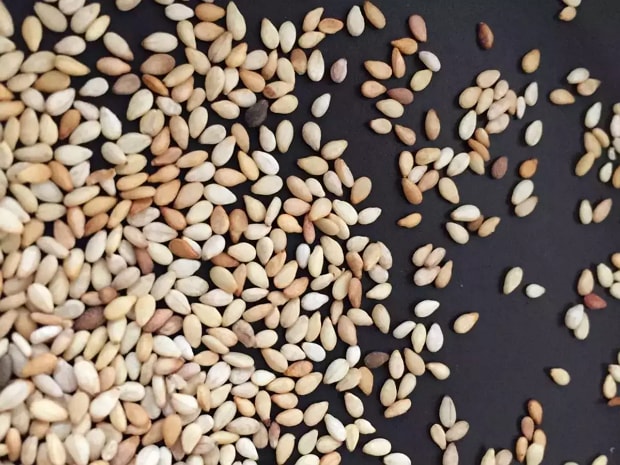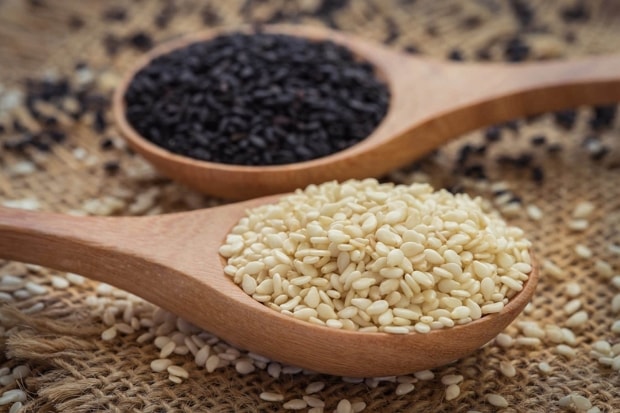6 benefits of sesame seeds, storage method, expiration date, calories
Sesame Nutrition

| Sesame (100g) Nutrition | |||
| Carbohydrate | Protein | Fat | Calories |
| 23.6g | 17g | 48g | 566kcal |
| Main Nutrition | Magnesium, Calcium, Iron | ||
| Main Benefits | Improves skin and cardiovascular health, anti-cancer effect, anti-aging | ||
| Side Effects | If you are allergic, it may cause skin rash or hives. | ||
Sesame refers to the seeds of sesame and perilla seeds. It is mainly used as a spice. It has a unique savory aroma and taste and a chewy texture. If consumed raw, it may not be digested well and may be excreted from the body. So it is better to eat it stir-fried. Sesame seeds are rich in vegetable unsaturated fatty acids. Sesame seeds can be roasted and consumed as is, or placed on top of food as a finishing garnish. Alternatively, you can squeeze out the oil and use it as oil, add it to songpyeon, or make it into gangjeong and eat it.
Sesame Benefits

1. Cardiovascular health
Sesame seeds are rich in magnesium. This may help lower blood pressure. And sesame seeds contain a variety of vitamins and antioxidants, which help prevent plaque buildup in your arteries. Sesame seeds also contain linoleic acid. This removes harmful cholesterol from the blood and strengthens blood vessels. Therefore, consuming sesame seeds helps prevent various cardiovascular diseases.
2. Anticancer Effect
Sesame seeds contain ingredients that may have anti-cancer effects. This is thanks to an ingredient called lignan. Lignan is one of the essential amino acids and has powerful antioxidant properties. So, consuming sesame seeds helps remove harmful oxygen radicals from our body. This can help prevent cancer cells from proliferating and prevent cells from being damaged, contributing to the anti-cancer effect. It also helps prevent various cancers.
3. Liver Health
Sesame seeds contain an ingredient called sesamin. This ingredient helps detoxify the liver and improve liver function. Additionally, sesame seeds contain various ingredients such as methionine and lecithin. These ingredients also function to excrete toxins accumulated in the liver and help activate liver cells. This improves liver health and is effective in preventing liver diseases such as fatty liver.
4. Bone Health
Consuming sesame seeds may also help with bone health. Sesame seeds contain various elements such as iron, calcium, and phosphorus. These ingredients play an important role in bone formation in the body and help improve bone density. It helps form not only bones but also teeth. So, consuming sesame seeds helps prevent bone diseases such as osteoporosis. And the ingredient called sesamin contained in sesame seeds can help reduce pain caused by arthritis.
5. Skin Care
Sesame seeds are rich in unsaturated fatty acids. This helps nourish the skin. The lecithin contained in sesame seeds is also effective in providing nutrients to the skin and creating healthy skin. And sesame seeds contain a component called tocopherol. This ingredient is an antioxidant that helps suppress skin aging by removing free radicals. And through this, it creates elastic skin and helps improve overall skin health.
6. Brain Health
Sesame seeds are rich in an ingredient called lecithin. Lecithin is an antioxidant that protects brain cells from damage and helps smooth blood supply to the brain. Lecithin also helps brain health by supplying nutrients to brain cells. This helps improve memory and activate brain function. So, consuming sesame seeds helps prevent dementia and prevents brain degeneration.
Storage Method
You can either roast sesame seeds in a frying pan and store them after cooling, or grind them and store them. Store unroasted sesame seeds in a ziplock bag or special container and freeze. It can be stored at room temperature in a cool place, but the shelf life is shorter than when stored frozen. Store roasted sesame seeds frozen in a special container. Also, it is better to store it in a glass container rather than a plastic container.
Side Effect
- Sesame seeds are high in calories. Therefore, if a person trying to manage their weight consumes too much, it may have a negative impact on their weight management.
- Sesame seeds are a food that can cause allergies. Therefore, if a person allergic to sesame seeds consumes sesame seeds, an allergic reaction may occur.
- Excessive consumption of sesame seeds may cause symptoms such as diarrhea.
References
💠HealthLine: 15 Health and Nutrition Benefits
💠Savorysuitcase: How to Store Sesame Seeds